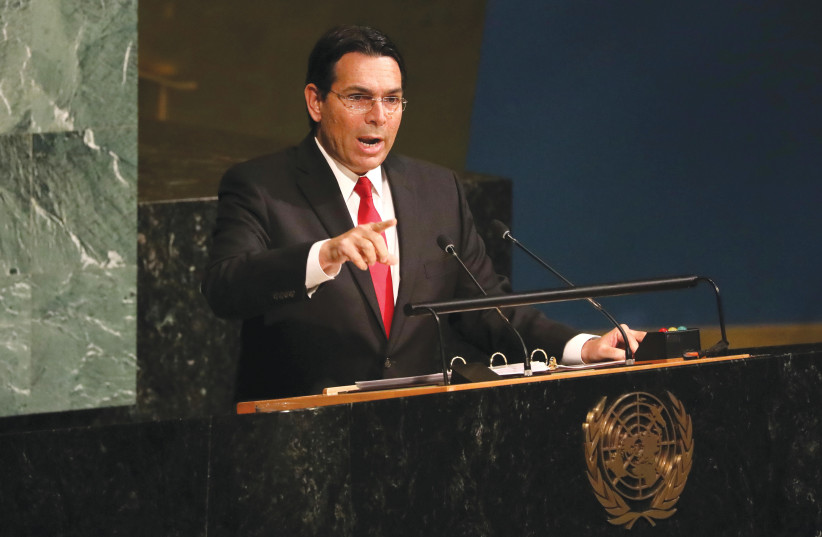According to the Universal Declaration of Human Rights (article 11), “Everyone charged with a penal offense has the right to be presumed innocent until proven guilty”. Over the last decade, however, it has become increasingly clear that this statement does not apply to Israel in the United Nations (UN). Israel has been in the sights of the UN for so long that targeting the country has become an institutionalized feature of the world body.
Moreover, Israel is the only nation in the world to which the United Nations Human Rights Council (UNHRC) devotes a permanent agenda (Item 7), which has been used to condemn Israel almost more times than all the countries of the world combined. This one-sided approach is noticeable over and over, not only in the UNHRC’s relentless bias against Israel but also in every preceding UNHRC resolution, fact-finding mission or even inquiry where Israel is involved, where Israel is predetermined to be guilty, with no chance of a fair hearing.
The UN bias reached a peak in May 2021, when Hamas launched a devastating war against Israel, by indiscriminately firing some 4,500 rockets at Israeli civilians. Instead of unequivocally condemning Hamas’s bombardment, a flagrant violation of international law, the UNHRC responded by creating a commission of inquiry headed by Navi Pillay to investigate the root cause of the conflict and condemn Israel for defending itself, as any sovereign nation would.
From the outset, the commission ignores the core facts of the so-called case. The fact is, Hamas once again launched a murderous assault on Israel. And yet, the UNHRC resolution that established this commission does not even mention the name Hamas, let alone indicate whether it will be investigated. In keeping with the UNHRC’s standard behavior, the findings of Pillay’s commission are a foregone conclusion, which will be presented to the world in June 2022.
According to Warren Buffet, “Leadership is the capacity to translate vision into reality.” That is exactly what Navi Pillay will attempt to do, to translate her skewed, biased vision of Israel and try to present it as reality to the world.

According to the UNHRC’s own charter, when creating a commission of inquiry, “members should, in all cases, have a proven record of independence and impartiality...” The point of a leader of a commission of inquiry is to be impartial. That is not a word that can be used to describe Pillay nor the UNHRC when it comes to Israel.
On several occasions, Pillay has been shown to be a vocal supporter of the Boycott, Divestment and Sanctions (BDS) movement, openly accused Israel of apartheid, signed The Global South Statement that calls on the UNGA to sanction Israel. Pillay has also accused Israel of war crimes and crimes against humanity for its defensive actions in 2014, once again against Hamas’s unprovoked terror.
Pillay’s prejudice dates back to the antisemitic Durban Conference, as well as the Durban Review Conference in 2009, both of which she fiercely supported. That very same conference in 2009, made a mockery of Human Rights and International Law by not only allowing then Iranian president Mahmoud Ahmadinejad and Holocaust denier to attend but also providing him a platform.
In light of the flagrant and systematic bias exhibited by both Pillay and the UNHRC, the conclusion of the inquiry was already written before the ink was even dry on the resolution establishing it.
This kind of situation would not stand in any court of a civilized country. A judge, such as Pillay, would be forced to recuse herself due to a conflict of interest and inability to adjudicate in an impartial manner. However, the issue here runs much deeper than that.
In essence, what the UNHRC is declaring with this commission of inquiry (as well as the countless other resolutions, fact-finding missions and investigations against Israel) is that the Jewish state does not have the right to defend itself from terror, nor should it be treated equally, like any other sovereign nation and member state of the UN.
The international community must remind the UN of its historic roots and the goals that it was created to pursue, as enumerated in the UN Charter: “To maintain international peace and security... and for the suppression of acts of aggression or other breaches of the peace... and in conformity with the principles of justice and international law.”
Anyone who cares about the rule of law and advancing true peace in the Middle East must call out this commission over its inherent bias and must not lend it any kind of credibility or authority.
The writer is the project manager at the International Legal Forum, an Israel-based network of over 4,000 lawyers and activists around the world, standing up for Israel and combating antisemitism in the international legal arena.
